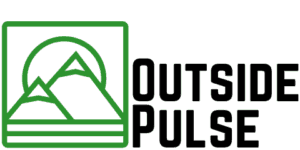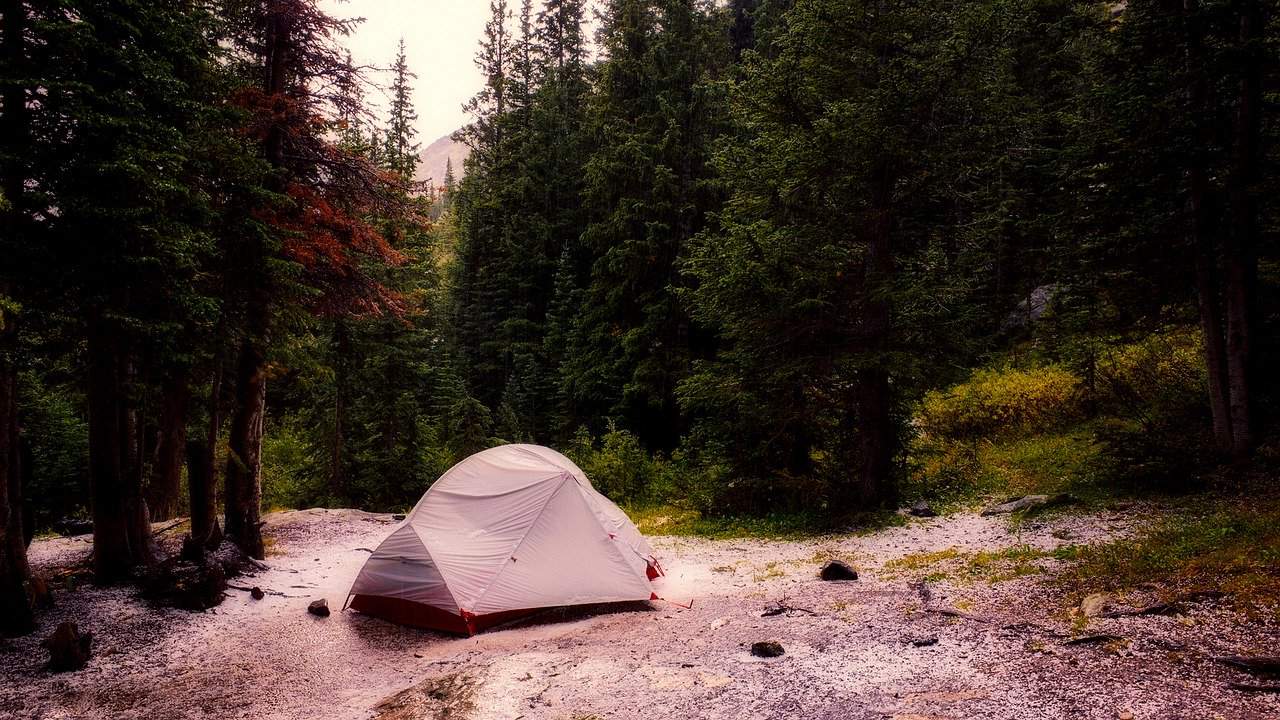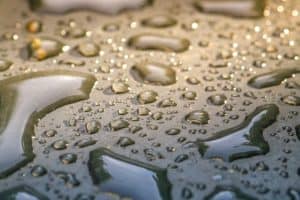Like most people, I just assumed tents where always waterproof, after all, what good is a tent for shelter if it can’t keep you dry when it’s raining?
But when looking for my most recent tent I started noticing tents that implied they were water-resistant and not waterproof. Which got me thinking are camping tents waterproof?
Are Camping Tents Waterproof?
After doing a lot of research on “are camping tents waterproof” I figured out the below answer.
While many tents are waterproof, not all tents are and even if a tent is “waterproof”, it’s important to remember that not all tents are created equal when it comes to waterproofing.
How to Know if a Tent is Waterproof
So how are you supposed to know whether a camping tent is waterproof or not? Well, luckily there are a few main indicators such as price, seasonal rating, and features that will not only let you know whether or not a tent is waterproof but also the level of waterproofing it offers.
Tent Price
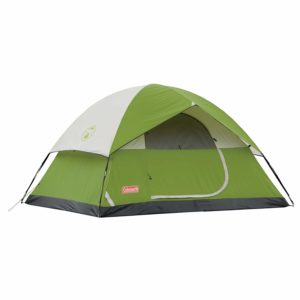 One of the easiest and best ways to discover whether a tent is waterproof is to look at the price of the tent. While this is not 100% reliable, like most things in this world when it comes to tents and waterproofing you get what you pay for.
One of the easiest and best ways to discover whether a tent is waterproof is to look at the price of the tent. While this is not 100% reliable, like most things in this world when it comes to tents and waterproofing you get what you pay for.
As cheaper tents from Walmart or Amazon that are under $40 such as the Yodo 2 Purchase Camping Tent are typically not waterproof or offer very little waterproofing.
While medium-priced and more expensive tents such as the Coleman Sundome 4-Person Tent and the ALPS Mountaineering Zephyr 3-Person Tent found on Amazon are waterproof.
Seasonal Tent Rating
Remember not all tents are made to withstand the same level of elements and weather. Because of this tent manufactures and outdoor companies use seasonal ratings for tents.
Campers should use these seasonal ratings as a guide to help them understand which seasons the tent is best suited for and the level of protection the tent offers.
There are four main seasonal ratings for tents that range from 1 to 4 season. Where a 1 season tent means the tent can handle only one season and milder weather. A 4 season tent can handle all four seasons and offers the most protection from rain and the elements
So if you’re looking for a waterproof tent, you want to go with either a 3 or 4 season tent as they will offer the most protection from the rain and elements.
Waterproof Tent Features
Many features help to make a modern tent waterproof so when checking out the specs of a particular tent make sure that it offers all of the below waterproofing features.
Most modern tents use some type of synthetic or man-made material such as nylon or polyester for the tent walls, ceiling, and floor to help keep the weight down. However, it’s important to understand that these materials by themselves offer very little waterproof protection.
This is why nylon and polyester are sprayed by the tent manufacturer with a water repellant compound to fully waterproof the material.
So you want to make sure the tent has a good layer of water repellant spray.
After the tent material has been waterproofed the next most important element of any quality tent is a good rainfly that covers the main body of the tent. A quality rain fly is important as it provides a second layer of protection for the roof of the tent and also helps to shed the water away from the tent.
Finally, when determining the level of waterproofing the tent offers don’t forget to inspect the quality and overall construction of the tent, paying particular attention to the tents weak points such as the seams, the bathtub which is the bottom of the tent, and the zippers and openings of the tent.
How to Waterproof A Tent
What if you already own a tent though that is either not waterproof or not as waterproof as you would like? Is there anything you can do to help improve the level of waterproofing on a tent?
The good news is yes if your tent is not currently waterproof there are several steps that you can take to help improve the tent’s level of waterproofing.
- Add a Tarp – One of the cheapest and easiest items you can add to waterproof a tent is a tarp. While it might not be the most attractive option when it comes to waterproofing a tent, it is one of the cheaper options as you can usually pick up a tarp for $15 or $20 at your local hardware store. While not absolutely necessary it can also be helpful to purchase a tarp with built-in grommets to help secure the tarp to the top of the tent.
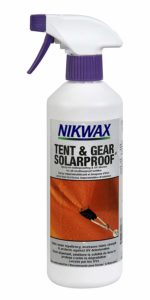 Water Repellant Spray – Another great way to waterproof or add additional waterproofing to a tent is by applying or adding additional waterproof spray directly to the tent materials such as Nikwax Tent & Gear Solar Proof Waterproofing from Amazon. The great thing about this spray is that not only does it provide waterproofing to the tent but it also provides UV protection to help prevent damage to the tent from the sun’s harmful rays. Don’t forget when applying this water repellant spray to the tent to pay particular attention to the weak points of the tent where water is likely to seep in or where water might pool or gather.
Water Repellant Spray – Another great way to waterproof or add additional waterproofing to a tent is by applying or adding additional waterproof spray directly to the tent materials such as Nikwax Tent & Gear Solar Proof Waterproofing from Amazon. The great thing about this spray is that not only does it provide waterproofing to the tent but it also provides UV protection to help prevent damage to the tent from the sun’s harmful rays. Don’t forget when applying this water repellant spray to the tent to pay particular attention to the weak points of the tent where water is likely to seep in or where water might pool or gather. - Seam Sealer – One of the most likely places to get leaks in your tent is at the seams. Which is why if you are going to waterproof a tent properly you can’t forget about protecting the seams. One of the best products on the market to waterproof tent seams is Coleman’s Seam Sealer.
- Ground Cover – When people think about waterproofing a tent they will often focus on the roof and walls of the tent but it’s also important not to forget about the bottom of the tent. To ensure that your tent stays dry both on the top and bottom when waterproofing your tent make sure that you add some ground cover between the tent and the ground itself. While you can buy purpose-built ground covers for tents, using another basic tarp should do the trick to help keep the bottom of your tent nice and dry.
Related Questions
How often should you waterproof a tent?
If you have a waterproof tent you do not need to update the waterproofing of the tent on a regular basis. The waterproofing of the tent should provide years of trouble-free use without any needed maintenance.
Instead, regularly inspect your tent for any failure points in its waterproofing and if any are found address them on a specific basis.
Also if it’s been a while since you’ve used the tent its always a good idea to perform the backyard test before you go camping. The backyard test consists of setting the tent up in your backyard visually inspecting the tent and hitting it with a garden hose to ensure the tent doesn’t have any leaks.
What is and do you need to season a tent in order to waterproof it?
Seasoning a tent simply means to leave your tent set up outside for a few days when it’s going to rain to allow the tent to go through the saturation and drying process a few times. By doing this you will allow the threads to expand around the stitching to prevent any potential water leaks around the seams.
Only canvas tents need to be seasoned. If you own a tent made from nylon or other synthetic material the seasoning process is not necessary.
Can you make your own water repellant spray for tents?
While there are many recipes out there claiming to be an effective homemade water repellant spray for tents using items like linseed oil, beeswax, or vinegar. None of them last near as long or do as good of a job as commercially available water repellent sprays such as Nikwax Tent & Gear Solar Proof Waterproofing.
Now that you know the answer to, are camping tents waterproof? Do you want to know which camping tents are best for the rain and wind? Check out our article “Best Tent for Rain and Wind While Camping“.
